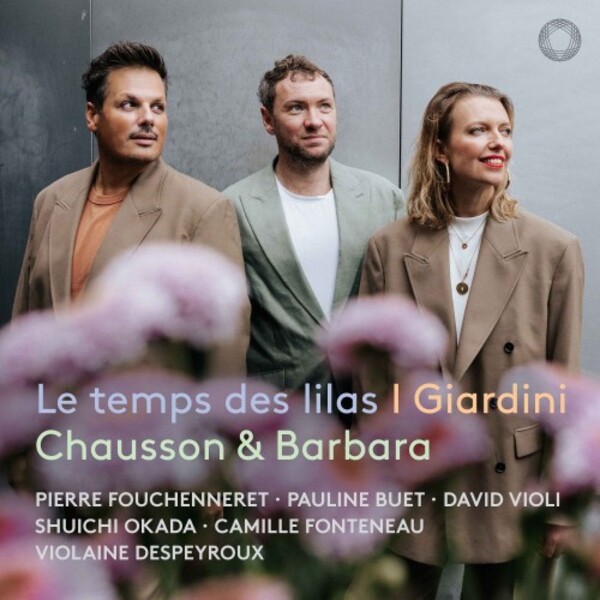Le Temps des lilas: Chausson & Barbara
View record and artist detailsRecord and Artist Details
Genre:
Chamber
Label: Pentatone
Magazine Review Date: 05/2025
Media Format: CD or Download
Media Runtime: 65
Mastering:
DDD
Catalogue Number: PTC5187 357

Tracks:
| Composition | Artist Credit |
|---|---|
| Concert for Violin, Piano and String Quartet |
(Amedée-)Ernest Chausson, Composer
I Giardini Pierre Fouchenneret, Violin |
| Poème |
(Amedée-)Ernest Chausson, Composer
I Giardini Pierre Fouchenneret, Violin |
| (Le) Temps des lilas |
(Amedée-)Ernest Chausson, Composer
I Giardini Pierre Fouchenneret, Violin |
| Les temps du lilas |
Barbara, Composer
I Giardini Pierre Fouchenneret, Violin |
Author: Charlotte Gardner
Once a comparatively rarer-spotted musical beast, Chausson’s bonkers-brilliant Concert for violin, piano and string quartet of 1891, dedicated to Eugène Ysaÿe, is suddenly popping up everywhere, very much including the recording studio, as my Collection on the work (2/25) illustrated. This latest addition to the pile from French chamber collective I Giardini – a sort of Gallic equivalent to the UK’s Kaleidoscope Chamber Collective, led by cellist Pauline Buet and pianist David Violi – appeared just in time to be slid last-minute into that Collection, where it held its own with aplomb, but without stealing any crowns. At that point, I praised the reading’s balance of ardent, spacious dreaminess with vibrant momentum, miked just far back enough to give a nice, natural sense of room, and its sensitively democratic balancing of violinist Pierre Fouchenneret (pleasantly nasally sweet-toned) and Violi in relation to their colleagues. Another defining key is a comparatively legato approach to articulation. All in all, it’s an elegant, emotionally committed reading full of distinctive personality, but perhaps not as colouristically wide-ranging as Le Magadure/Braley (Appassionato, 5/24) or Pike/Poster (Chandos, 5/13).
Onwards, and Buet and Violi then get creative with the other work Chausson dedicated to Ysaÿe, the single-movement Poème, Op 25, for violin and orchestra published in 1896, creating a new version for which the violin is accompanied by piano and string quartet – the same forces as the Concert. Their stated aim has been to give the solo violin more flexibility than an orchestra would allow but with a richer sound palette than is afforded by the violin-piano version. The result is interesting. Inevitably it sounds suddenly much closer to the Concert’s sound world, and from a textures perspective I found my ear drawn far more than usual to the accompaniment’s inner textures and rhythms. However, that’s also because the solo violin is less prominent, Fouchenneret sounding much more a first among equals than a full-blown soloist. Accept it as a newly minted sextet and it’s impossible not to admire and enjoy the reading’s delicate, sober beauty (try 11'15" for a moment of exquisite hushed sweetness), or the loving chamber dynamic between the six of them. To my ears, though, it’s more an interesting experiment than a eureka moment.
The programme also features two versions of ‘Les temps des lilas’, based on a text by Maurice Bouchor. First, the Chausson mélodie, transferred to Buet’s cello. Then the 1962 Barbara chanson, Buet’s voice accompanied by Violi. It’s these two soulfully poetic readings I’ve found myself unreservedly drawn to on the album, but since this is nevertheless such an adventurous, thoughtfully imaginative project, realised with atmosphere and polish, I suggest you give it a spin and decide for yourself.
Discover the world's largest classical music catalogue with Presto Music.

Gramophone Digital Club
- Digital Edition
- Digital Archive
- Reviews Database
- Full website access
From £8.75 / month
Subscribe
Gramophone Full Club
- Print Edition
- Digital Edition
- Digital Archive
- Reviews Database
- Full website access
From £11.00 / month
Subscribe
If you are a library, university or other organisation that would be interested in an institutional subscription to Gramophone please click here for further information.




